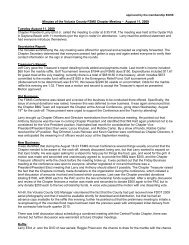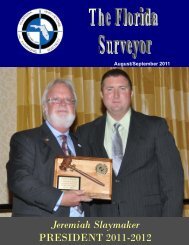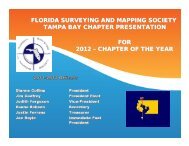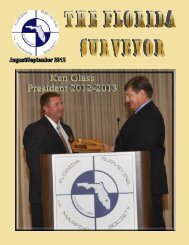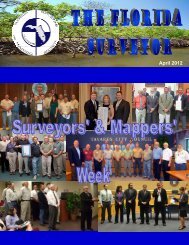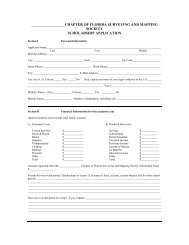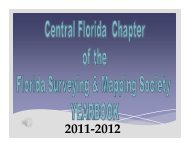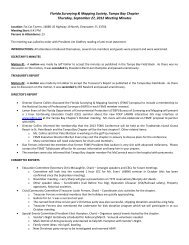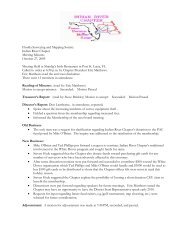July 2012 - FSMS
July 2012 - FSMS
July 2012 - FSMS
You also want an ePaper? Increase the reach of your titles
YUMPU automatically turns print PDFs into web optimized ePapers that Google loves.
IF YOU EVER WONDERED WHY . . . ASK MIKE! Mike Whitling, PSM<br />
Why when we give in to something do we “knuckle under?”<br />
Today the knuckles are the joints of the fingers, but in Anglo-Saxon and<br />
Medieval English it also referred to the elbow and knee joints (and in<br />
1944 to the cranial knuckle, giving us the ‘knucklehead.’) As a token of<br />
submission a person would fall to his knees before his conqueror. So to<br />
knuckle under meant to put the knuckles of one’s knees to the ground, ‘to<br />
bend the knee before,’ ‘to bow down to.’<br />
Why is a penny called a “penny?”<br />
In the US, the term “penny” is technically an incorrect slang usage. The<br />
official name for the US coin is a "cent", but when it was first issued it<br />
was very similar to the one-penny coins that had been in use in British<br />
colonial days, so most people called the new coins pennies. The old<br />
name persisted even when the coin was downsized to its current 19 mm<br />
diameter in 1856, and we all continue to call them "pennies" even today.<br />
It's a bit like using the word "dial" for a telephone even though phones<br />
haven't had dials for decades.<br />
Why is a nickel called a “nickel?”<br />
Nickel metal is heavily used for coins today because it's inexpensive and<br />
is very hard, so nickel coins don't wear out quickly. But when the Mint first<br />
starting making coins, nickel couldn't be used because it was so hard it<br />
damaged the relatively primitive coin presses then in use. By the middle<br />
of the 19th century metallurgy had improved enough that the Mint started<br />
experimenting with making low-denomination coins out of an alloy of 25%<br />
nickel and 75% copper. The first coins to use that alloy were a 3¢ piece<br />
in 1865 and a 5¢ piece the next year. At the same time the Mint also<br />
issued smaller coins with the same denominations but made of a silver<br />
alloy. To distinguish them, people started referring to them by their denominations<br />
and metal; e.g. "three cents silver", "three cents nickel", and<br />
so on. By 1873 the nickel coins had proven to be successful so the silver<br />
versions were discontinued, but people still talked about "three cents<br />
nickel" and "five cents nickel". The nickel 3¢ piece was discontinued 16<br />
years later, leaving "five cents nickel" as the only coin remaining of the<br />
original four. The name morphed into "five cent nickels" and was eventually<br />
shortened to just "nickel".<br />
Why is a dime called a “dime?”<br />
The word "Dime" derives from Latin decima (pars), meaning "a tenth."<br />
The dime was briefly called a "disme" which was a version of the French<br />
word "dixième", again deriving from the Latin decima. Its spelling and<br />
pronunciation quickly simplified to the familiar "dime" within a year or two<br />
of the coin's introduction.<br />
Why is a dollar called a “dollar?”<br />
The word "dollar" has a long history dating back to central Europe in the<br />
15th century. Some of the first large-size silver coins were minted from<br />
metal mined in what is now the southeastern part of Germany. Most of<br />
the silver veins were found in valleys. The word for valley in old-style<br />
German was "Thal", pronounced roughly "tohl". The coins soon became<br />
known as Thalers ("tohllers") meaning "from the valley". Thalers proved<br />
to be so popular that similar coins were eventually used all over Europe<br />
as a common exchange medium. Each region adapted the name to its<br />
local language and spelling; by the time the coins were used in the Netherlands<br />
they had become "dalers", still pronounced with a short 'a'. To<br />
those of us accustomed to English spelling that looked too much like it<br />
should be pronounced "dayler", so the spelling gradually changed to<br />
something closer to its pronunciation, giving the familiar word “dollar.”<br />
Section 20 of Article 1 of the U.S. Constitution provided, "That the money<br />
of account of the United States shall be expressed in dollars, or units...<br />
and that all accounts in the public offices and all proceedings in the<br />
courts of the United States shall be kept and had in conformity to this<br />
regulation." In other words, this act designated the United States dollar as<br />
the unit of currency of the United States.<br />
Quick Facts:<br />
♦ In the 1950's Wheaties stopped using athletes on their<br />
boxes and started using Disney figurines. Sales went<br />
down 15%. General Mills had a meeting and decided<br />
to recall their sports stars. The Disney boxes are valuable<br />
today.<br />
♦ Researchers have discovered that events such as pleasant family<br />
celebrations or evenings with friends boost the immune system for<br />
the following two days. Unpleasant moments had the opposite effect.<br />
♦ Robot comes from the Czech word 'robota' which means 'forced<br />
work or labor.' The first known case of robot homicide occurred in<br />
1981, when a robotic arm crushed a Japanese Kawasaki factory<br />
worker.<br />
♦ The Eiffel Tower was the tallest building in the world when it was<br />
completed in 1889. It was built for the World's Fair to demonstrate<br />
that iron could be as strong as stone while being infinitely lighter.<br />
♦ The most played song on American radio during the twentieth century<br />
was “You've Lost That Loving Feeling” which was written by<br />
Barry Mann, Phil Spector, and Cynthia Weil. Although recorded by<br />
different artists, the song is the only one in history to be played over<br />
8 million times on the radio.<br />
♦ "Weird" Al Yankovic received a Bachelor's degree in Architecture in<br />
1981. He also served as valedictorian of his high school at age 16.<br />
♦ The oldest business in the United States of America is the cymbal<br />
company Zildjian, which was founded in Constantinople in 1623.<br />
♦ The five most stolen items in a drugstore are batteries, cosmetics,<br />
film, sunglasses, and Preparation H. One of Preparation H's main<br />
ingredients is shark liver oil. The oil not only helps shrink hemorrhoids,<br />
but will shrink any tissue.<br />
♦ The phrase "often a bridesmaid but never a bride" actually comes<br />
from an advertisement for Listerine mouthwash. The text was written<br />
by Milton Feasley and first appeared in 1925. The advertisement<br />
was so successful that it ran for more than ten years.<br />
♦ The official name of the St. Louis Gateway Arch is "The Jefferson<br />
National Expansion Memorial." The Gateway Arch looks taller than it<br />
is wider, but it is exactly 630 feet by 630 feet.<br />
♦ An adult bedbug can survive up to one year without feeding.<br />
♦ Worker ants may live seven years and the queen may live as long<br />
as 15 years.<br />
♦ People are more likely to be a target for mosquitoes if you consume<br />
bananas.<br />
♦ The venom of a female black widow spider is more potent than that<br />
of a rattlesnake.<br />
♦ The buzz that you hear when a bee approaches is the sound of its<br />
four wings moving at 11,400 strokes per minute. Bees fly an average<br />
of 15 miles per hour.<br />
♦ The underside of a horse's hoof is called a frog. The frog peels off<br />
several times a year with new growth.<br />
♦ The intestines of a newborn are about 11 feet long. The length will<br />
double by the time the baby grows to adulthood.<br />
♦ Running the tap while waiting for water to get hot or cold can waste<br />
5 gallons per minute.<br />
♦ The top of the tower of the Empire State Building was originally intended<br />
(though never used) as a mooring place for dirigibles.<br />
♦ Pumpernickel, the dark bread made from coarsely ground rye gets<br />
its name from its supposed effect on those who consume it. Pumpernickel<br />
is composed of the German words pumpen, "to fart," and<br />
Nickel, "devil."<br />
Send your thoughts to drmjw@aol.com



